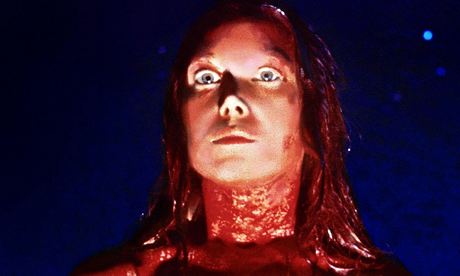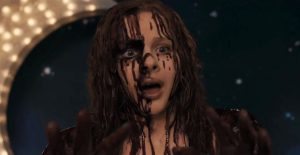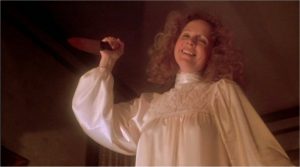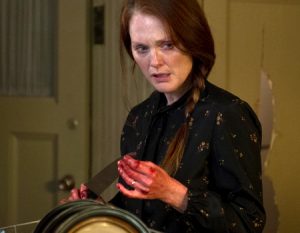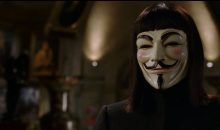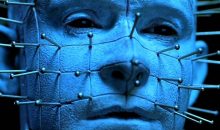A Tale of Three Carries
Girl throws tampons at other girl, girl asks boy to take other girl to the prom, other girl gets pig blood dumped on her head, other girl goes on telekinetic rampage. While it might not be a tale as old as time, Stephen King’s debut novel Carrie resonated with audiences upon its 1974 release. With Brian de Palma’s 1976 movie, Carrie White became part of the horror culture, as iconic a character as Jason or Michael Meyers. Unlike those two movie monsters, however, Carrie can’t hide behind a mask, and any actress taking the mantle of the titular character would be compared to Sissy Spacek, and her Oscar-nominated performance. Ditto Piper Laurie, whose Margaret White captured an unhinged sense of religious fanaticism not often done well on the big screen.
Still, someone had to try, and Chloë Grace Moretz and Julianne Moore delivered powerful performances in the 2013 Carrie remake. While 2013’s Carrie isn’t 1983s’s Scarface (a remake that kicks the 1932 original right out of your head), neither is it 1998’s Psycho (an unwanted shot-for-shot remake). 2013’s Carrie lies somewhere in the middle, doing some things better than the original and some things worse. The remake’s faithfulness to Brian de Palma’s original proves its undoing, as the film wastes the opportunity to be more than a cosmetic face-lift. It upgrades the tech and the gore (replacing landlines for smartphones and water coolers for ashtrays), but does little else to distinguish itself as an iconic movie all its own.
Here’s what the remake does right: casting. Stephen King’s strength is his characterization; making the audience feel for his characters. The remake edges the original with its cast. Sissy Spacek and Piper Laurie were iconic as Carrie and Margaret White, but as Oscar-worthy as their performances were in 1976, their successors perform better. Spacek seemed cowed and expressionless for most of the film, even when she was taking her revenge on those who’d hurt her. Chloë Grace Moretz delivers a much more well-rounded performance as Carrie. Moretz especially shines at the end, when Carrie’s rampage begins. While Spacek kills with a blank stare, Moretz unnerved me with her slight smile. Modern-day Carrie wasn’t just killing, she enjoyed her revenge, which made the film’s final scenes that much more powerful.
Piper Laurie may have made the role of Margaret White, but Julianne Moore nailed it. As a cutting, self-harming White, Moore is terrifying. When the movie opened with the elder white giving birth to Carrie, I was worried the film would send to much time forcing the audience to sympathize with the monster, as Rob Zombie did with his remake of Halloween. Thankfully, director Kimberly Pierce did not such thing. She gives us more Margaret than the 1976 movie did, but the added scenes with Moore make us more afraid of her, rather than feel pity for her.
The remake’s supporting cast also does a better job at filling their roles as high school cliches. I can forgive the 1976’s dated feel, but on my recent re-watch the goofiness of the supporting cast troubled me. Maybe popular jocks looked like William Katt in 1976, but his overall silly smile and half-assed reasoning makes his motivations to take Carrie to the prom ring hollow. Ditto John Travolta, although it’s nigh impossible to take John Travolta seriously these days…
Where the remake errs is in its slavish faithfulness to de Palma’s film. As an example, let’s talk about Stephen King’s obsession with the JFK assassination for just a minute. Both in 1947, King was a teenager in 1963 when JFK was shot, and the impact the president’s death had on a young impressional King is felt in a number of his works. The most notable is King’s 2011 novel 11/22/63, soon to be a Hulu miniseries, about a man who travels back in time to stop Lee Harvey Oswald from killing JFK. But King was writing about the aftermath of JFK’s death much much earlier. A large chunk of Carrie deals with the White Commission, a thinly veiled version of the Warren Commission. The Warren Commission tried (and ultimately failed) to come to any sort of satisfying conclusion about who really killed JFK. In Carrie, the White Commission actively attempts to sweep Carrie White’s telekinetic powers under the rug, denying that such powers exist.
If your knowledge of Carrie only goes as far as her film versions, you remember none of this. King’s book, partially told in flashbacks, wire reports, and news clippings a la World War Z, is a conspiracy tale as much as it is a revenge one. While the White Commission plays a small part in the book, its presence speaks to the distrust and mistrust of the government that people felt during the 1970s.
The 2013 Carrie remake wasted its opportunity to include the White Commission, or the scene of Carrie’s childhood when she makes stones rain from the sky, or the original ending (which differs from both film versions and ends the film on a more unsettling note). Governmental distrust is as relevant as ever, and a more faithful novel adaptation might have raised the remake’s impact. However, the 2013 remake seems to worship at Brian de Palma’s feet. Dialogue, pacing, and set decoration are all lifted from the 1976 movie, making me wonder why anyone bothered to remake Carrie in the first place. Sure, the story needed some modernization, and sure, I’ll watch anything starring Julienne Moore, but I guarantee in 35 years that Tim Tebow reference will be just as dated as the casual slapping of the 1876 movie is today.
tl;drs
Quick summary: Both movies tell the story of Carrie White, a high-school outcast who comes into telekinetic powers, which she uses to wreck havoc on her high school. The 2013 version is a decent, if unnecessary remake of the critically acclaimed original.
Too many writers? Nope. The screenwriters of both versions stick pretty faithfully to the source material, and keep a lot of the book’s dialogue. Several key book scenes are missing from both versions; while the remake could have included those scenes it chose not to.
Recommended if you like: Iconic horror movies and their average remakes.
Better than I expected? The original features interesting camerawork rarely seen in modern horror films. The cast of the remake all deliver intense performances.
Worse than I hoped? The remake felt just a notch below amazing, but I’m not sure what could have been done to push it over the edge. Less faithfulness to the 1976 movie? More scenes from the novel?
Would it work better in a different medium? Doubtful. It’s been tried as a TV pilot and a musical. Carrie seems to work best on the big screen.
Verdict: Somewhere in-between the high mark of Scarface (1983) and the nadir of Psycho (1998), 2013’s Carrie is a welcome if unneeded remake, hitting most of the time, even if it doesn’t rise to the standards of the 1976 movie.
Related Reading: Screenrant’s 10 Differences between the Carrie Remake and Original 1976 Movie

